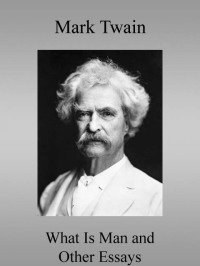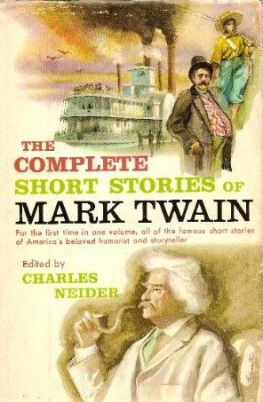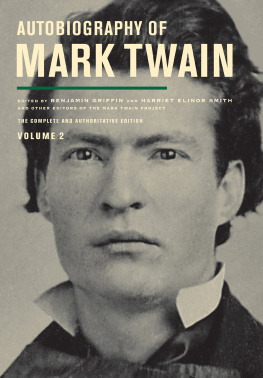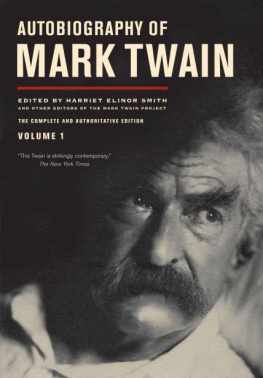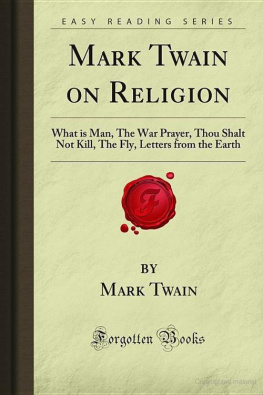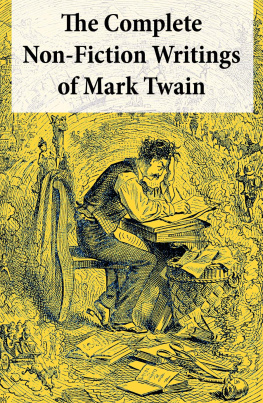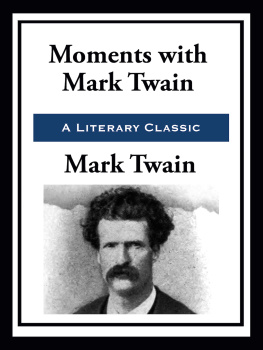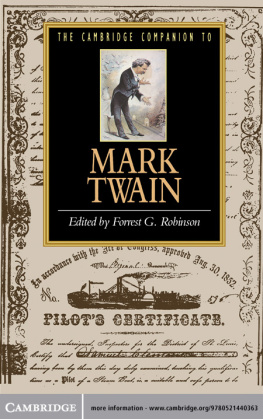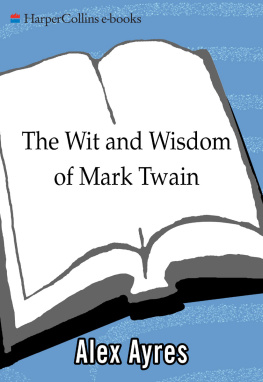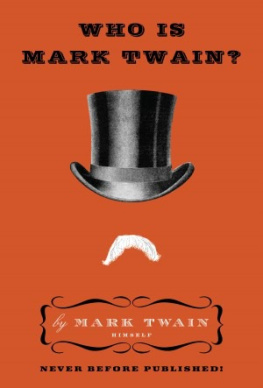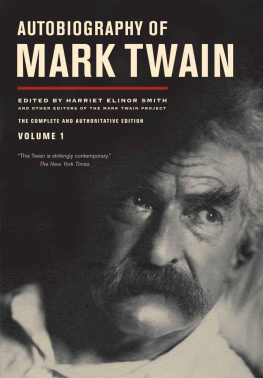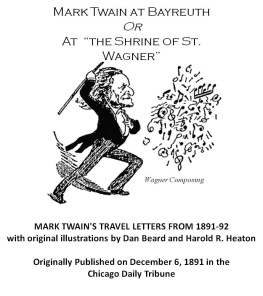Mark Twain - What Is Man? and Other Essays
Here you can read online Mark Twain - What Is Man? and Other Essays full text of the book (entire story) in english for free. Download pdf and epub, get meaning, cover and reviews about this ebook. genre: Non-fiction. Description of the work, (preface) as well as reviews are available. Best literature library LitArk.com created for fans of good reading and offers a wide selection of genres:
Romance novel
Science fiction
Adventure
Detective
Science
History
Home and family
Prose
Art
Politics
Computer
Non-fiction
Religion
Business
Children
Humor
Choose a favorite category and find really read worthwhile books. Enjoy immersion in the world of imagination, feel the emotions of the characters or learn something new for yourself, make an fascinating discovery.
- Book:What Is Man? and Other Essays
- Author:
- Genre:
- Rating:4 / 5
- Favourites:Add to favourites
- Your mark:
- 80
- 1
- 2
- 3
- 4
- 5
What Is Man? and Other Essays: summary, description and annotation
We offer to read an annotation, description, summary or preface (depends on what the author of the book "What Is Man? and Other Essays" wrote himself). If you haven't found the necessary information about the book — write in the comments, we will try to find it.
What Is Man? and Other Essays — read online for free the complete book (whole text) full work
Below is the text of the book, divided by pages. System saving the place of the last page read, allows you to conveniently read the book "What Is Man? and Other Essays" online for free, without having to search again every time where you left off. Put a bookmark, and you can go to the page where you finished reading at any time.
Font size:
Interval:
Bookmark:
What Is Man?
by Mark Twain
What Is Man?
I
What Is Man?
The Old Man and the Young Man had been conversing. The Old Man had asserted that the human being is merely a machine, and nothing more. The Young Man objected, and asked him to go into particulars and furnish his reasons for his position.
a. Man the Machine. b. Personal Merit
Old Man. What are the materials of which a steam-engine is made?
Young Man. Iron, steel, brass, white-metal, and so on.
O.M. Where are these found?
Y.M. In the rocks.
O.M. In a pure state?
Y.M. Noin ores.
O.M. Are the metals suddenly deposited in the ores?
Y.M. Noit is the patient work of countless ages.
O.M. You could make the engine out of the rocks themselves?
Y.M. Yes, a brittle one and not valuable.
O.M. You would not require much, of such an engine as that?
Y.M. Nosubstantially nothing.
O.M. To make a fine and capable engine, how would you proceed?
Y.M. Drive tunnels and shafts into the hills; blast out the iron ore; crush it, smelt it, reduce it to pig-iron; put some of it through the Bessemer process and make steel of it. Mine and treat and combine several metals of which brass is made.
O.M. Then?
Y.M. Out of the perfected result, build the fine engine.
O.M. You would require much of this one?
Y.M. Oh, indeed yes.
O.M. It could drive lathes, drills, planers, punches, polishers, in a word all the cunning machines of a great factory?
Y.M. It could.
O.M. What could the stone engine do?
Y.M. Drive a sewing-machine, possiblynothing more, perhaps.
O.M. Men would admire the other engine and rapturously praise it?
Y.M. Yes.
O.M. But not the stone one?
Y.M. No.
O.M. The merits of the metal machine would be far above those of the stone one?
Y.M. Of course.
O.M. Personal merits?
Y.M. PERSONAL merits? How do you mean?
O.M. It would be personally entitled to the credit of its own performance?
Y.M. The engine? Certainly not.
O.M. Why not?
Y.M. Because its performance is not personal. It is the result of the law of construction. It is not a MERIT that it does the things which it is set to doit can't HELP doing them.
O.M. And it is not a personal demerit in the stone machine that it does so little?
Y.M. Certainly not. It does no more and no less than the law of its make permits and compels it to do. There is nothing PERSONAL about it; it cannot choose. In this process of "working up to the matter" is it your idea to work up to the proposition that man and a machine are about the same thing, and that there is no personal merit in the performance of either?
O.M. Yesbut do not be offended; I am meaning no offense. What makes the grand difference between the stone engine and the steel one? Shall we call it training, education? Shall we call the stone engine a savage and the steel one a civilized man? The original rock contained the stuff of which the steel one was builtbut along with a lot of sulphur and stone and other obstructing inborn heredities, brought down from the old geologic agesprejudices, let us call them. Prejudices which nothing within the rock itself had either POWER to remove or any DESIRE to remove. Will you take note of that phrase?
Y.M. Yes. I have written it down; "Prejudices which nothing within the rock itself had either power to remove or any desire to remove." Go on.
O.M. Prejudices must be removed by OUTSIDE INFLUENCES or not at all. Put that down.
Y.M. Very well; "Must be removed by outside influences or not at all." Go on.
O.M. The iron's prejudice against ridding itself of the cumbering rock. To make it more exact, the iron's absolute INDIFFERENCE as to whether the rock be removed or not. Then comes the OUTSIDE INFLUENCE and grinds the rock to powder and sets the ore free. The IRON in the ore is still captive. An OUTSIDE INFLUENCE smelts it free of the clogging ore. The iron is emancipated iron, now, but indifferent to further progress. An OUTSIDE INFLUENCE beguiles it into the Bessemer furnace and refines it into steel of the first quality. It is educated, now its training is complete. And it has reached its limit. By no possible process can it be educated into GOLD. Will you set that down?
Y.M. Yes. "Everything has its limitiron ore cannot be educated into gold."
O.M. There are gold men, and tin men, and copper men, and leaden men, and steel men, and so onand each has the limitations of his nature, his heredities, his training, and his environment. You can build engines out of each of these metals, and they will all perform, but you must not require the weak ones to do equal work with the strong ones. In each case, to get the best results, you must free the metal from its obstructing prejudicial ones by educationsmelting, refining, and so forth.
Y.M. You have arrived at man, now?
O.M. Yes. Man the machineman the impersonal engine. Whatsoever a man is, is due to his MAKE, and to the INFLUENCES brought to bear upon it by his heredities, his habitat, his associations. He is moved, directed, COMMANDED, by EXTERIOR influencesSOLELY. He ORIGINATES nothing, not even a thought.
Y.M. Oh, come! Where did I get my opinion that this which you are talking is all foolishness?
O.M. It is a quite natural opinionindeed an inevitable opinionbut YOU did not create the materials out of which it is formed. They are odds and ends of thoughts, impressions, feelings, gathered unconsciously from a thousand books, a thousand conversations, and from streams of thought and feeling which have flowed down into your heart and brain out of the hearts and brains of centuries of ancestors. PERSONALLY you did not create even the smallest microscopic fragment of the materials out of which your opinion is made; and personally you cannot claim even the slender merit of PUTTING THE BORROWED MATERIALS TOGETHER. That was done AUTOMATICALLYby your mental machinery, in strict accordance with the law of that machinery's construction. And you not only did not make that machinery yourself, but you have NOT EVEN ANY COMMAND OVER IT.
Y.M. This is too much. You think I could have formed no opinion but that one?
O.M. Spontaneously? No. And YOU DID NOT FORM THAT ONE; your machinery did it for youautomatically and instantly, without reflection or the need of it.
Y.M. Suppose I had reflected? How then?
O.M. Suppose you try?
Y.M. (After a Quarter of an Hour.) I have reflected.
O.M. You mean you have tried to change your opinionas an experiment?
Y.M. Yes.
O.M. With success?
Y.M. No. It remains the same; it is impossible to change it.
O.M. I am sorry, but you see, yourself, that your mind is merely a machine, nothing more. You have no command over it, it has no command over itselfit is worked SOLELY FROM THE OUTSIDE. That is the law of its make; it is the law of all machines.
Y.M. Can't I EVER change one of these automatic opinions?
O.M. No. You can't yourself, but EXTERIOR INFLUENCES can do it.
Y.M. And exterior ones ONLY?
O.M. Yesexterior ones only.
Y.M. That position is untenableI may say ludicrously untenable.
O.M. What makes you think so?
Y.M. I don't merely think it, I know it. Suppose I resolve to enter upon a course of thought, and study, and reading, with the deliberate purpose of changing that opinion; and suppose I succeed. THAT is not the work of an exterior impulse, the whole of it is mine and personal; for I originated the project.
O.M. Not a shred of it. IT GREW OUT OF THIS TALK WITH ME. But for that it would not have occurred to you. No man ever originates anything. All his thoughts, all his impulses, come FROM THE OUTSIDE.
Font size:
Interval:
Bookmark:
Similar books «What Is Man? and Other Essays»
Look at similar books to What Is Man? and Other Essays. We have selected literature similar in name and meaning in the hope of providing readers with more options to find new, interesting, not yet read works.
Discussion, reviews of the book What Is Man? and Other Essays and just readers' own opinions. Leave your comments, write what you think about the work, its meaning or the main characters. Specify what exactly you liked and what you didn't like, and why you think so.

